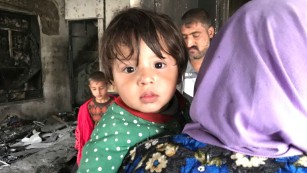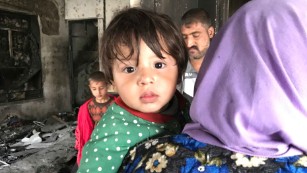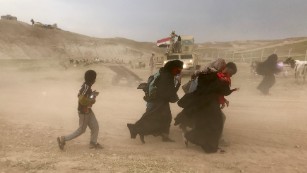On the frontline of ISIS' last stand in Iraq
Flies buzz around the drying rivulets of blood seeping from the heads of two corpses draped over the hood of a Humvee.
One of the bodies, partially charred, lies face down; by his chest is webbing where he had kept magazines for an automatic rifle. The other, with long matted hair, faces the Humvee's bullet-pocked windshield. His ragged pants are pulled down around his knees, a piece of green and yellow electric wire loosely wound around his ankles.
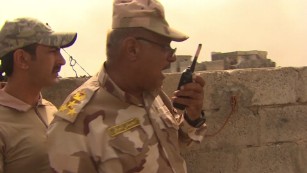
Battle for Mosul entering final phase
Two Iraqi soldiers step in front of the Humvee. Raising his phone, one takes a selfie of the two in front of their trophy. For a moment, they flash a smile.
"They had pills in their pockets," one of the soldiers tells me. "That's how they keep fighting."
His comrades killed the ISIS fighters earlier in the afternoon when they tried to sneak from the ISIS-held 17 Tammouz, or 17th July neighborhood, into the adjacent Mushairfa district in Mosul.
We are just about one hundred meters from the most forward line of the Iraqi Army's Ninth Armoured division. In the background, there is the steady thud of mortar and artillery fire. Helicopters circle overhead, occasionally flying further into the city, noses down. A line of black smoke shooting out in front signals a rocket has been fired.
Why Mosul matters
Since Mosul's capture by ISIS fighters in June 2014, Mosul has been a vital stronghold for ISIS.
The largest city under ISIS control in Iraq and Syria, it was the city from which the group first declared the establishment of its so-called caliphate.
Since then, ISIS has gradually lost its other Iraqi cities -- Ramadi, Tikrit and Falluja -- to government forces.
As many as 750,000 people are estimated to remain in Mosul, once a cosmopolitan trade hub of 2 million residents.
Iraqi officials say ISIS now only controls one tenth of the city. But they anticipate that the final, most difficult phase is yet to come. Iraqi forces are preparing to push into the 17th Tammouz neighborhood, named after the 1968 coup d'état that brought the Ba'ath Party to power. On June 6, 2014, ISIS fighters entered Mosul through this neighborhood, and within hours were in full control of the city. This was the start of an offensive that saw ISIS take control of the cities of Baiji and Tikrit, and eventually took them to the outskirts of Baghdad.
ISIS renamed 17th Tammouz to "Fatah," harking back to the lightning conquests of the early Islamic empire that spread the realm from the Atlantic to the borders of the Indian subcontinent.
It was just a few years ago that one of the mottos of ISIS was "the Islamic state is here to stay and will expand." And for a brief moment it seemed they were unstoppable. That now seems like ancient history.
"Da'ish is now calling 17th Tammouz 'wadi ath-thabat,'" the "valley of resolve", says Lieutenant Colonel Abu Fatima (not his real name -- he wasn't authorized to speak to the media).
There, he says, they will make their last stand in Mosul -- not, as many expect, in west Mosul's Old City, where on July 4, 2014, the self-declared "caliph" Abu Bakr al-Baghdadi made his first and only appearance.
'Tragic' plight
From a bullet- and shell-pocked glass-littered three-story building, once a photography shop overlooking 17th Tammouz, Lt. Col. Abu Fatima and his men have a panoramic view. 17th Tammouz rises gently up a hill before them. A thick cloud of black smoke billows into the sky. It's a densely packed neighborhood of small houses. While small arms fire rattles constantly, there is no movement in the empty streets and alleyways.
Lt. Col. Abu Fatima, from the Baghdad district of Adhamiya, has been speaking by phone with residents inside. "They're almost completely out of food. They're eating grass," he says. "Tragic" is how he describes their plight.
What is left of Mosul: 'We don't belong here anymore'
A hundred meters further south is the final line of Iraqi forces. There, a young officer in a crisp uniform who declines to give his name says they've spotted a family in a building on the edge of 17th Tammouz. "They want to get to us but they're afraid of being shot by ISIS snipers," he says.
"Yesterday, the snipers shot a woman who tried to flee," chimes in one of his men.
We duck into a building across the street to try to see the family. "Watch out for the snipers," a soldier accompanying us says as we duck down to run across the roof and take cover behind a wall. The soldiers have knocked holes in the breezeblocks to keep an eye on movements in 17th Tammouz, and occasionally to fire at anything that moves.
"They keep running back and forth between the houses and a white truck out there," says one of the soldiers, peering through the hole with binoculars. Loud bangs echo from the floor below as the soldiers fire across the field into 17th Tammouz.
CNN camerawoman Mary Rogers has put her camera up to another hole, filming the void before her. A loud crack, and the wall shakes. Through her viewfinder she sees a puff of white powder where the round hit just inches away.
Moments later, shots ring out from below as the soldiers respond.
And then, quiet. We bid the soldiers farewell, crouch and run off the roof, down the stairs and back into the rubble-strewn street.
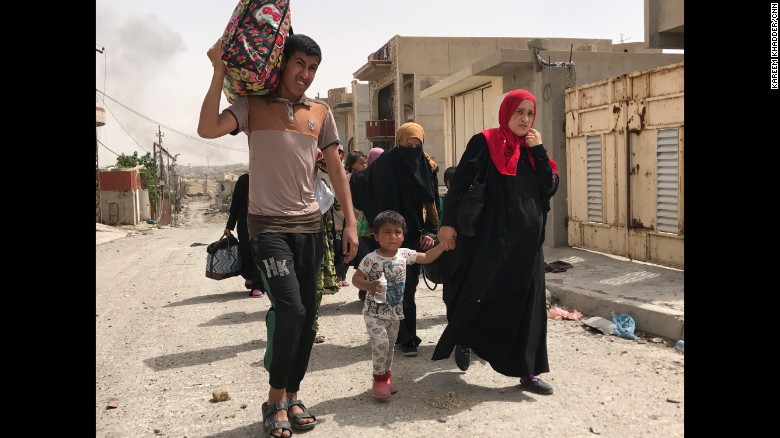
Residents flee an ISIS-controlled neighborhood in Mosul.
A group of five women in black, two teenage boys, four children and a baby are huddled by a wall. They've just crossed over from ISIS territory.
"We left early this morning after taking cover for days in the bathroom," says Sina, holding a child in her arms. "Our menfolk told us, 'Go! Go!' We said we can't because of the shelling, but then we put our faith in God and we left." She declined to give her full name out of fear for her safety.
The baby in her arms is her 11-month old granddaughter, Hajar, Arabic for the Biblical Hagar. In Arabic, hajar means to move, to migrate.
"We moved four times in the last three years because of the fighting around Mosul," says Sina, nodding to the little girl.
'Day of reckoning'
Retired policeman Abu Said (he asked we not use his real name, fearing for the safety of relatives still inside ISIS-controlled territory) didn't flee the fighting. As the fighting reached his neighborhood of Mushairfa, he and his family huddled under the stairs.
We ran into him as he was leading troops around the area, showing them houses that ISIS members occupied.
Mosul victory in sight -- at a cost
He recounted his ordeals under ISIS. "They told my son, your father is a kafir, an infidel, because I worked for the Iraqi government. That dog, Abu Bakr al-Baghdadi, said anyone who worked for the government is an infidel. Of course, I'm a Muslim. I pray, I fear God, but in their minds I'm a kafir."
For almost three years, since June 2014, he prepared for the day Iraqi forces returned to Mosul. "I gathered information, I watched them. I wrote down their names. I kept an eye on what they were doing."
"This is the day of reckoning," he tells me, pointing the soldiers to another house. Inside, they rifle through cupboards and drawers.
Among the toys, plastic cars and trucks on the floor are a crumpled uniform and an empty ammunition box. In the adjacent room, they find medical kits, complete with condoms, and a homemade plastic placard with a likeness of the black banner of ISIS.
Abu Said smiles.
News Courtesy: www.cnn.com

